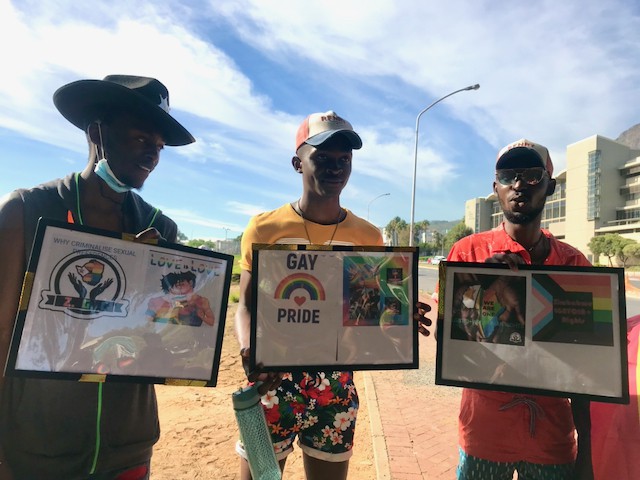
12 April 2021
Protesters gathered at the Zimbabwean consulate in Cape Town to demand gay rights. Photo: Tariro Washinyira
An official at the Zimbabwe Consulate in Cape Town, who would not give his name, refused to sign a memorandum calling for gay rights that was delivered by about 20 people. They had marched from Keizersgracht Street to the consulate in Kyper Street on Monday.
The official demanded the police keep the media out, that no photographs be taken, and only three representatives of the protest be allowed through the gate to deliver their petition. Police complied and stopped journalists from filming on the premises.
Organiser of the march for gay rights in Zimbabwe, Shingirai Musekiwa, said, “We have handed over the petition to an unknown man who chose to discriminate against us. He has refused to tell his name and sign the petition … Zimbabwe calls itself an independent country and is turning 41 on 18 April, but still … sees gays and lesbians as animals.”
Musekiwa and his partner Elton Chibhebhe started the Zimbabwe LGBTQ+ Crusader movement to repeal section 78 of the Zimbabwean Constitution which criminalises homosexuality.
The march was supported by people from the Triangle Project, the Pride Shelter Trust, LGBTI asylum seekers and refugee activists Pachedu, and Queers Without Borders.
Talent Mazenge, who joined the march, and lives in South Africa, said, “I spent four years without talking to my family [from Zimbabwe]. They couldn’t accept me. It was difficult for me being judged by my family which is supposed to show love, and support me.”
Reverend Laurie Gaum, who joined the march, told GroundUp: “This group is exposed and unprotected in South Africa. Zimbabwe continues to criminalise LGBTI making them desperate to leave and find safety in South Africa. The Zimbabwean government needs to step up and take responsibility for its citizens’ rights … and see to it that the most vulnerable are protected and able to access their full citizenship.”
“It’s sad that church and religions use the Bible to exclude people. Good religion is supposed to preach that all people are made in God’s image, but sadly the church has not been in many cases able to accommodate, show love and be hospitable to all its membership.”